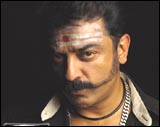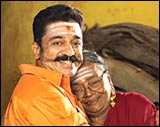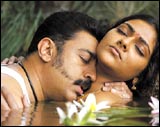 While announcing the shooting of the film Virumaandi, then known as Sandiyar, Kamal Haasan said he wanted to convey the message of non-violence through a violent film.
While announcing the shooting of the film Virumaandi, then known as Sandiyar, Kamal Haasan said he wanted to convey the message of non-violence through a violent film.
And Virumaandi is an extremely violent film, full of blood, gory deaths, mutilated bodies, abusive language and what not. But the film does convey the intended message. The film is gripping and very well executed. In fact, I am willing to see it again to enjoy some of the finer nuances of the film. The film is a spectacle.
| |||||||||||
The story unravels with Angela Katthamuthu (Rohini), a lawyer with a doctorate in the study of human rights. She works for a human rights organisation and visits the jail to interview the inmates on death row. Angela is a strong opponent of capital punishment.
Kotthalathevar first tells his version of the story in which Virumaandi is the villain and responsible for the killings of nearly two dozen innocents in a village in Theni district. He tells Angela that Virumaandi deserves to be exterminated from the face of the earth.
But when she questions Virumaandi, she gets a different version in which the villain is Kotthalathevar himself.
That is the true version. Virumaandi is to be executed for a crime he did not commit.
Kotthalathevar, who had an eye on Virumaandi's land -- where water flows freely -- first agrees to give his niece Annalachumi's (Abhirami) hand to Virumaandi in marriage. Both fall in love, but then Kotthalathevar changes his mind.
Nallamanaiker, (Napoleon), the kind-hearted head of the village, is unable to do anything in the face of Kotthalathevar's mounting villainy. Kotthalathevar, in turn, manages to place under his own control almost the entire corrupt police force. When Kotthalathevar brutally massacres a large number of villagers, a helpless Naiker is forced to look on. Kotthalathevar then uses animal cunning to place the blame squarely on Virumaandi.
 Meanwhile, Virumaandi and Annalachumi elope and get married. Unfortunately, she is kidnapped back to the village by Kotthalathevar, who gifts her to his henchman. A humiliated Annlachumi commits suicide. Virumaandi has one more case foisted on him, of raping Annalachumi and thus being responsible for her death. When lured by money, the priest who marries them off in a temple also turns against Virumaandi.
Meanwhile, Virumaandi and Annalachumi elope and get married. Unfortunately, she is kidnapped back to the village by Kotthalathevar, who gifts her to his henchman. A humiliated Annlachumi commits suicide. Virumaandi has one more case foisted on him, of raping Annalachumi and thus being responsible for her death. When lured by money, the priest who marries them off in a temple also turns against Virumaandi.
Nallamanaiker helps Virumaandi escape. But in the process, he gets murdered by Kotthalathevar. That brings Kotthalathevar to jail. Now, both of them are languishing in jail, with Kotthalathevar enjoying his jail term in the lap of luxury, thanks to his money and connections. And Virumaandi, the innocent victim, waits for death.
Kamal Haasan the director has done a marvellous job in showing the same incidents from two different points of view.
The story that starts with Angela videotaping some of the inmates ends at the same place, after a lot of action and gripping tension. After Angela's cameraman tapes the corrupt jail official instructing some of his men to knock off the honest jailer (Nasser), both Angela and the cameraman are on the run inside the jail. A riot in the jail is followed by more violence and more deaths. But in the gripping finale, Angela escapes with the help of Virumaandi.
The director has used the clashes that used to take place till recently in the southern districts of Tamil Nadu as reference points, and shown them realistically onscreen. To his credit, perhaps as a precautionary measure, he has not taken the sides of any community, as was feared by the leader of Puthiya Thamizhagam, Dr Krishnaswamy.
Though it is said that National Award winner Venu is the best cinematographer India has to shoot crowd scenes, one feels Keshav Prakash, assistant to Ravi K Chandran in Kamal Haasan's currently shelved project, Marudanayakam, is as good, or even better.
With more than a dozen people in each frame, Virumaandi is not an easy film to make, but both the director and the cinematographer have done an amazing job.
 One jarring note in the film is Kamal's fair skin, which stood out like a sore thumb. Among all the other dark-skinned villagers, his extremely fair skin did not go well. Perhaps he should have darkened his skin to look like the rest of them.
One jarring note in the film is Kamal's fair skin, which stood out like a sore thumb. Among all the other dark-skinned villagers, his extremely fair skin did not go well. Perhaps he should have darkened his skin to look like the rest of them.
The film does remind one of Kamal's earlier Thevar Magan, but technically and in terms of the quality of execution, Virumaandi has moved ahead. When Bharathan (director of Thevar Magan) was alive, he was described as the best maker of violent films. No one could match the violent vibrations palpable in his films.
Now, with Virumaandi, Kamal Haasan has gone a step ahead.
Without any hesitation, one can aver that Kamal Haasan as the director and screenplay writer of Virumaandi has done a great job. But the same cannot be said of Kamal Haasan the actor. There are many other performers who have done better jobs than Kamal Haasan in the film.
For example, the two female characters, Annalachumi and Angela (beautifully portrayed by Abhirami and Rohini), steal the show with their understated but strikingly confident performances. If Pasupathy as Kotthalathevar is menacingly different, Napoleon as Nallamanaiker has a quiet dignity about him.
Virumaandi is definitely a Kamal film but this one belongs to Kamal the director, not Kamal the actor.








More from rediff